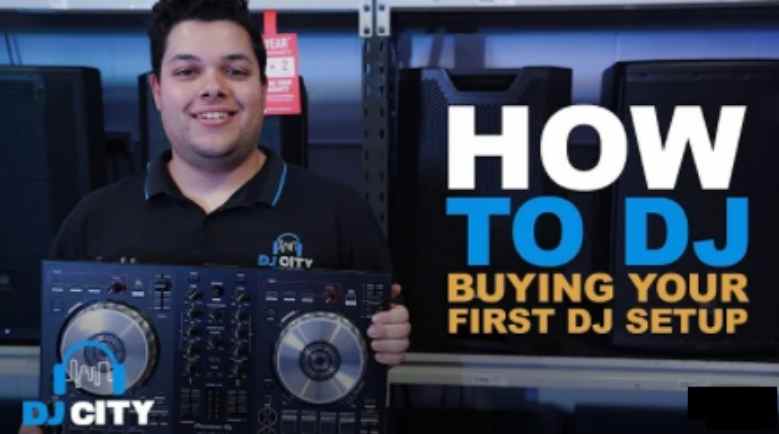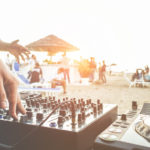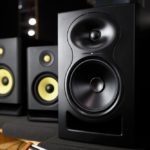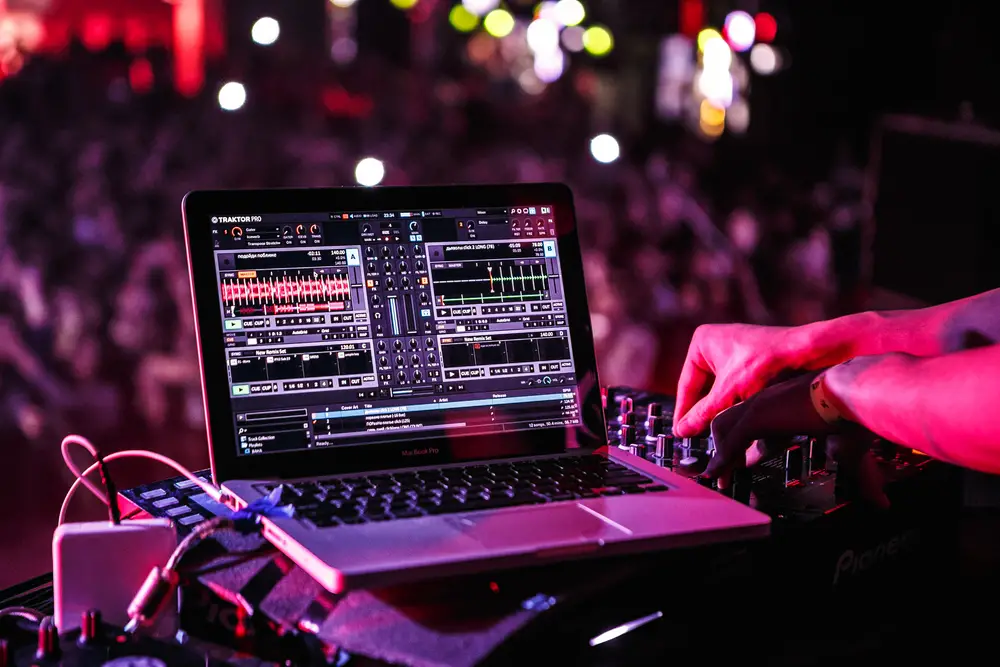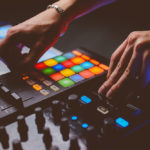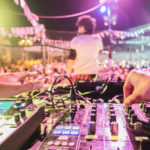When it comes to building your first DJ set up, there’s a whole bunch of essential equipment you’ll need to get yourself started.
Luckily, you should be able to do it on a budget, thanks to the growing number of brands that are producing DJ equipment for both bedroom ravers and mobile DJs.
We’ve put together a guide to help you figure out what you need to get started on your DJ journey.
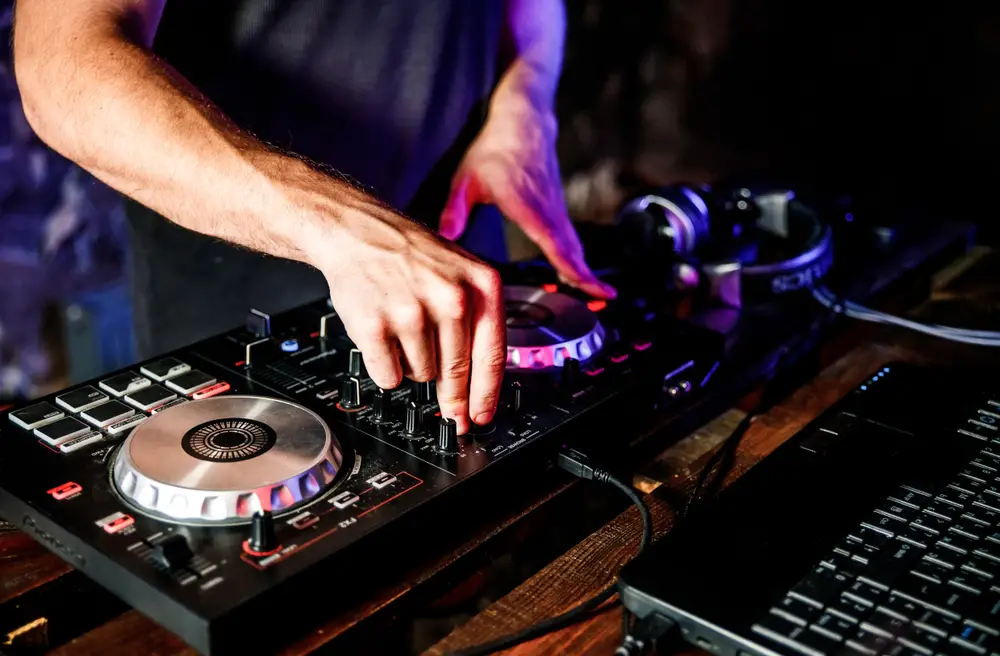
What Are The Different Types Of DJ Setups?
There are several different types of DJ setups that you can choose from. Some of them are more streamlined than others and require far less equipment.
If you want to start off small, you can simply use your laptop, but you’ll need to get the right software too. Another simple option includes using a turntable (can be vinyl or CD) and a mixer.
Whilst using a turntable, you can upgrade your software by using a laptop and a DJ interface package will add a bunch of cool effects and options.
If you’d rather use digital music (which is more common today), you can get away with using a small kit that uses a laptop, controller, DJ software, and an audio interface.
Equipment
Below you’ll find a list of the equipment you’ll need, and what they’re used for.
In short, the equipment you’ll need to DJ is:
- DJ Turntables
- Mixers
- Controllers
- CDJs
- Software
- Headphones
- Speakers
- Accessories
DJ Turntables
Owning a turntable is a DJ must. If you’re looking to use vinyl or CD – digital music will be covered in Controllers – you’ll need to have a set of turntables if you want to DJ.
This piece of gear is essential, especially if you want to scratch or queue singles, so you should definitely consider getting one if you’re going old school. If you want to use two turntables at once, you’ll need to use a mixer.
Mixers
A mixer is probably the most important part of any DJ setup. They’re a form of audio mixing console that allows you to perform different tricks and effects. It also allows you to seamlessly transition between tracks.
Using the slider, you’ll be able to scratch, make mashups, pan, control levels, and use FX.
You can also connect your headphones, speakers and even hook up your mixer up to your laptop (PC or Mac) for recording and mixing.
Controllers
If you’re using an entirely digital setup, then you’ll definitely need to get a DJ controller.
These work by combining your turntables and mixers into one singular piece of equipment. DJ controllers are also easily portable, so you can take them to any gigs you have with very little effort.
Whilst using a controller, you’ll be able to use your computer software as part of your setup, giving you everything you need for a set – including drum pads, trigger pads, MIDI controls, and microphone connections.
Controllers come with built-in jog wheels which allow you to replicate “scratching” with digital audio files. You can also use the trigger pads to import sounds from your computer and you customize the settings from your computer software.
If you’re just starting out as a DJ and don’t want to carry around a lot of DJ equipment, your best option is to invest in a DJ controller.
CDJs
CDJs are individual digital DJ decks with USB support and onboard displays, so you can use them without a laptop. Simply plug in a USB memory stick full of your favorite tracks, and voilà; you’re good to go.
However, if you prefer to use a laptop, that’s perfectly okay, too!
Each CDJ features a single jogwheel, but it tends to be a lot larger than the jogwheels found on controllers.
This is a big pull for many, as larger jogs make scratching and beat matching a little easier, especially for those transitioning to the digital world from analog turntables and real vinyl.
Besides the singular jogwheel, the biggest difference between CDJs and controllers is the lack of a built-in mixer, so, unfortunately, you will have to buy a discrete mixer as well as your CDJs.
The silver lining here is that you get more control over your gear, your sound, and how you perform.
You may also hear CDJs referred to as “club gear”, the reason being, most club venues have two of these bad boys ready and waiting for you in the booth when you roll in for a show.
Cards on the table, these things are expensive, even before you factor in the costs of your mixer and all your other equipment, so they’re perhaps not as “beginner-friendly” as a controller.
That said, CDJ setups are considered the best of the best, so it might be something you want to invest in a little later in your career.
Software
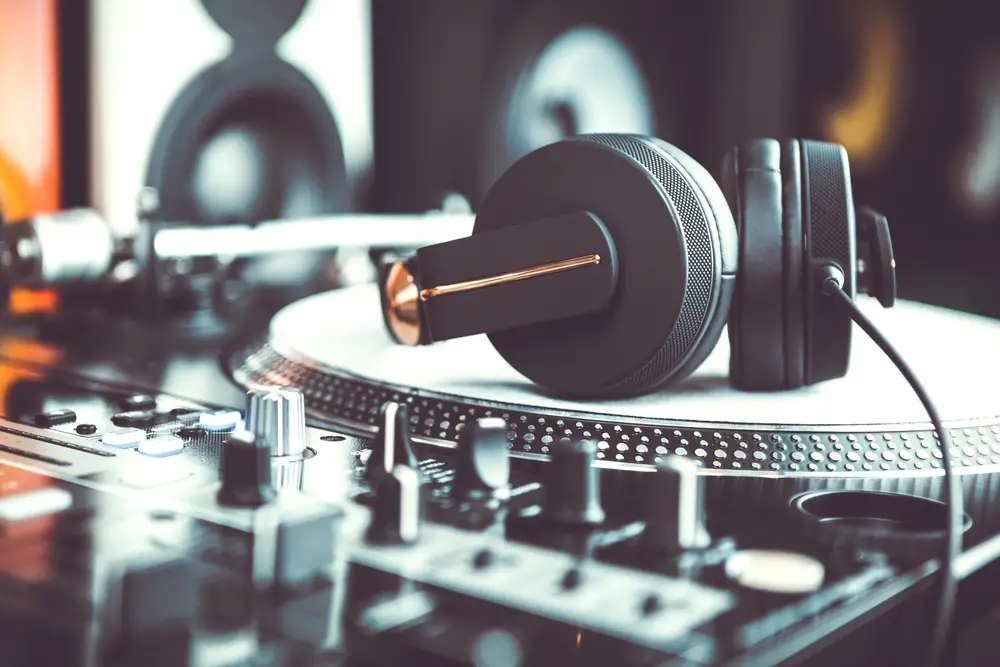
Whether you want to kick it old school and use CDs and vinyl, or you want to have a completely digital setup, you’re gonna need some sort of decent software that will allow you to operate your controller.
Using software helps you create track mashups, assign sounds to trigger pads, add sound effects, arrange your playlists and so much more. Without any DJ software, you won’t be able to use your controller properly.
A lot of DJ controllers come with software – or stripped-down versions – of popular DJ software to get you started. These will help you learn how to use your controller properly, and you’ll be able to start mixing your own tracks pretty quickly.
Some of the best and most recommended software out there is Virtual DJ, Serato, and Traktor. As noted, most DJ controllers will come in a form of software, so don’t worry too much about having to purchase them separately.
If you want more, it’s better to upgrade as your controller will most likely come with the best program that works with it.
Headphones
This might seem basic, but headphones are actually an essential part of DJ equipment as they allow you to hear both decks separately so that you can mix and transition tracks with ease.
Owning a good pair of headphones will give you the opportunity to practice at home before you perform in front of crowds. You’ll also be able to produce music without disrupting anyone, giving you the chance to produce and mix just about anywhere.
If you’ve ever noticed DJs holding one headphone to their ear, it’s usually because they’re queuing up their next song.
The slider on the mixer can be used to choose which audio output the audience is listening to – DJs listen to what you can’t hear on their headphones, which is most likely when they’re about to mix a new song or sound.
Speakers
PA Speakers
If you want to start gigging and performing for people, you’ll need a set of PA speakers. You might not always need them, but quite a lot of venues don’t have the best sound systems. So it’s worth investing in a decent PA system if you’re looking to gig.
If you’re playing weddings or performing at outdoor events, you’ll need a larger setup. If you’re just doing house parties, you won’t need anything massive.
If you’re just creating music at home, you won’t need a PA system.
Monitor Speakers
If you’re just creating tracks in your bedroom, monitor speakers are your best bet. Of course, you can use headphones to mix, but no one will be able to hear you, and they can’t replace the electrifying sounds that come from speaker systems.
Luckily, you don’t need to spend too much money on getting a decent set of monitor speakers.
Accessories
There are some accessories you might want to invest in that will make your life as a DJ a lot simpler.
If you’re exclusively performing in your bedroom, invest in a laptop and controller stand, as it’ll keep everything neat and tidy.
If you’ll be traveling around with your gear, make sure you get a sturdy case as it’ll reduce the chance of your equipment becoming damaged. You can also get custom-made cases specifically for your setup.
Frequently Asked Questions
How much does DJ equipment cost?
Nowadays, there are more and more companies that provide DJ equipment. If you’re looking for a basic beginner setup, or you’re just looking to mix at home, it can be relatively cheap.
On average, DJ equipment can cost around $1,400 for everything you need, but this is dependent on the type of setup you want and how high-end your equipment is.
If you’re looking for a home setup, it can cost a lot less, as you typically only need a laptop, headphones, monitor speakers, DJ software, and a controller.
Typically, DJ controllers will come with a software subscription, so you don’t have to worry about paying extra for it.
If you’re looking for a more professional setup, be prepared to spend a lot more on your equipment. If you’re worried about costs, you can also look at purchasing some of your equipment secondhand, as this will save you quite a bit of money.
Do you need a license to DJ?
If you’re performing in a club or a bar, music performances are usually covered by PRS for music and PPL for DJs to play music. In some cases where a single event is being held (i.e. an office) you may need to apply for a PRS and PPL.
We hope you love the products we recommend. We may collect a commission if you purchase through one of our links. This doesn't cost you anything extra. If you do, thank you! As an Amazon Associate, I earn from qualifying purchases.

